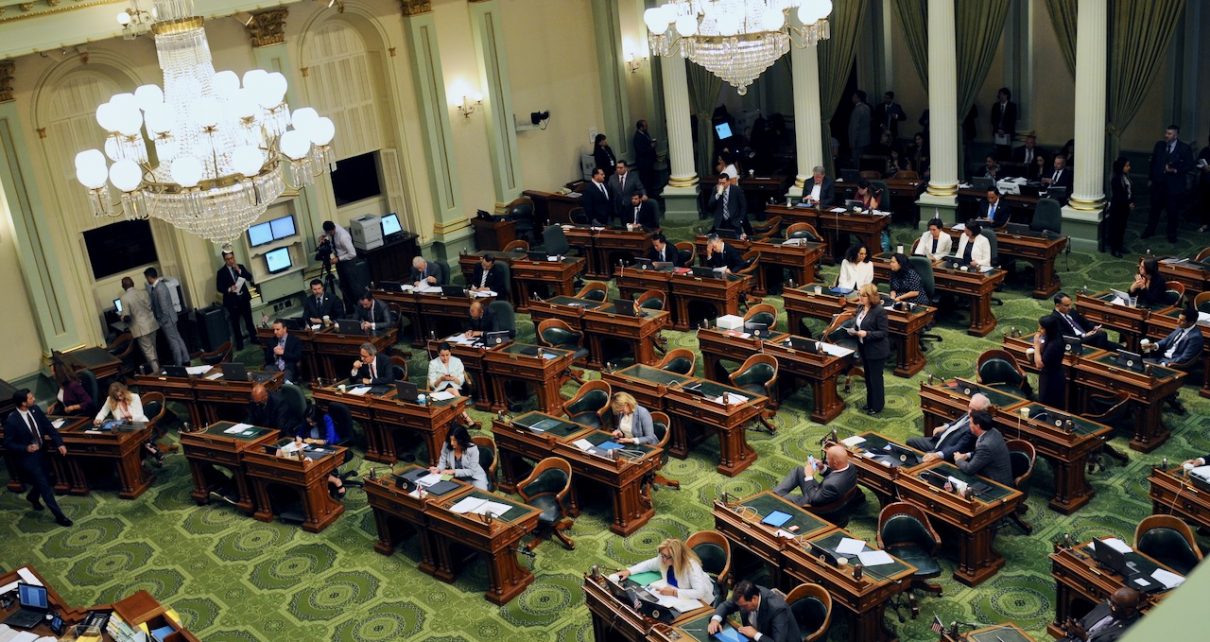
California State Assembly Chamber. (Photo: Kevin Sanders for California Globe)
Does a ‘Continuous Appropriation’ Violate the Principle that one Legislature Cannot Bind a Future One?
One legislative body cannot limit or restrict its own power or that of subsequent legislatures
By Chris Micheli, December 21, 2021 2:19 am
According to the Senate Budget and Fiscal Review Committee, a continuous appropriation is defined as the “amount available each year under a permanent constitutional or statutory expenditure authorization. A continuous appropriation is not dependent on passage of the budget.”
Similarly, the California Department of Finance glossary of terms includes two definitions of the term, continuous appropriation: The first definition is “an appropriation for a set amount that is available for more than one year.”
The second definition is “constitutional or statutory expenditure authorization that is renewed each year without further legislative action. The amount available may be a specific, recurring sum each year; all or a specified portion of the proceeds of specified revenues that have been dedicated permanently to a certain purpose; or, whatever amount is designated for the purpose as determined by formula, e.g., school apportionments. Note: Government Code section 13340 sunsets statutory continuous appropriations on June 30 with exceptions specified in the section and other statutes. Control Section 30.00 of the annual Budget Act traditionally extends the continuous appropriations for one additional fiscal year.”
There is a judicial doctrine at the federal and state levels that one legislative body cannot limit or restrict its own power or that of subsequent legislatures and, therefore, the act of one legislature does not bind its successors. Because a continuous appropriate does not require further legislative action and will continue into the future, does a continuous appropriation violate this judicial doctrine?
The point of a continuous appropriation is to provide a specified sum of state funds on a continuous basis without the need to go through the annual budget process. These can be authorized by federal law, the state Constitution, or a state statute. As a California appellate court noted, “In some circumstances, the law authorizes ‘continuing appropriations’ that run from year to year without the need for further authorization.” White v. Davis (2003) 30 Cal.4th at p. 538.
A court of appeal initially scrutinized the category of “continuing appropriations” in California Assn. for Safety Education v. Brown (1994) 30 Cal.App.4th 1264, 1282. In that case, the court explained that “[a]n appropriation is a legislative act setting aside `a certain sum of money for a specified object in such manner that the executive officers are authorized to use that money and no more for such specified purpose.’ [Citation.] A continuous [or continuing] appropriation runs from year to year without the need for further authorization in the budget act. [Citations.]” (Fn. omitted, italics added.)
We have in California a number of statutes and voter-approved measures that establish continuing appropriations that are independent of the annual budget act which authorize payments for items such as tax refunds, disability and retirement payments, and payments to bond holders.
In explaining continuous appropriations, another court of appeal observed that “nothing in . . . article IV, section 12, expressly bars continuing appropriations. On its face, section 12 prohibits the Legislature from sending specified appropriation bills to the Governor prior to the enactment of a budget, and it provides for exceptions to this prohibition; it does not otherwise limit the Legislature’s authority to enact appropriations.” (White v. Davis I 98 Cal.App.4th 969, 984.) There is provision that limits the form in which an appropriation may be adopted.
So, what is the issue? There is the “familiar principle of law that no legislative board, by normal legislative enactment, may divest itself or future boards of the power to enact legislation within its competence.” (City and County of San Francisco v. Cooper (1975) 13 Cal. 3d 898, 929; see also In re Collie 38 Cal.2d at p. 398; French v. Senate 146 Cal. at p. 608.) Specifically, California courts have ruled that neither house of the Legislature may bind its own hands or those of future Legislatures by adopting rules not capable of change. (In re Collie, supra, 38 Cal.2d at p. 398.)
Because a continuous appropriation would bind a future legislature to continue the specified annual funding level, it would appear that such appropriations violate the judicial doctrine against binding future legislatures. Nonetheless, the reality is that, absent a federal funding requirement or a state constitutional requirement, any continuous appropriation made by statute can, in fact, be changed by a future legislature.
As a result, even though a statutory continuous appropriation likely violates this judicial doctrine, in practice such a continuous appropriation can simply be changed by another enacted statute by the same or a future legislature.
- Compensation for Eminent Domain - February 9, 2026
- Corporate Securities Law of 1968 - February 8, 2026
- Deposit of Unclaimed Property in California - February 8, 2026




